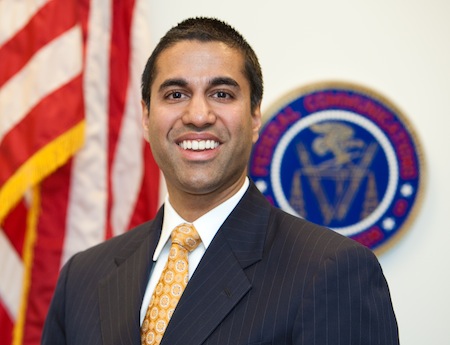FCC's Pai Calls AT&T-DirecTV Conditions 'Forced Tribute'

The smarter way to stay on top of broadcasting and cable industry. Sign up below
You are now subscribed
Your newsletter sign-up was successful
FCC commissioner Ajit Pai outlined his partial dissent from the AT&T-DirecTV merger approval Monday with a lengthy statement. Pai approved the underlying merger, as did all the commissioners. But he dissented from the "17 pages of conditions" put on the deal.
Pai has long argued against "regulating by condition"—applying conditions that serve a particular regulatory agenda but are not merger-specific—and suggested the FCC's demands on the deal were not supported and constituted a regulator "wish list" that had nothing to do with deal at hand. "These conditions are the forced tribute that the company must offer to mollify the Capitol," he said.
In fact, commissioner Pai said that the deal needed no conditions, and pointed to the Justice Department approval of the deal as not threatening competition. To be fair the Justice Department is only making an antitrust determination while the FCC looks at broader public interest obligations.
While Democratic commissioner Mignon Clyburn praised the condition mandating high-speed, low-cost broadband to low-income households, Pai saw it very differently. "When the Commission instructs a regulated entity that it must offer a particular service for no more than a particular price, there is a name for that: It is called rate regulation."
He also says the FCC condition preventing the combined company from discriminating against unaffiliated over-the-top providers is not justified. In fact, he says, the evidence suggests the opposite, that any attempt to hamper broadband customers access to OTT providers would hurt the company, not help it.
"The Commission’s theory is also internally contradictory," he says. "For example, the Commission contends on one hand that AT&T would seek to harm unaffiliated over-the-top video providers in order to encourage customers to subscribe to DirecTV’s video package. Yet it concludes in another section that over-the-top video providers are in a different product market than multichannel video programming distributors such as DIRECTV because 'for most consumers today, OVD [online video distribution] services are not substitutes for MVPD services.' Well, which is it? Do over-the-top video providers compete with DirecTV or not? The FCC’s creative heads-we-win-tails-AT&T-loses view of the video marketplace embraces Wilde’s dictum that 'consistency is the hallmark of the unimaginative.'"
Pai took aim at the condition requiring AT&T/DirecTV to "fork over" to the FCC every interconnection agreement, calling it intrusive, as was the requirement that there be an independent minder of proper traffic as well as a compliance officer inside AT&T/DirecTV. "There is no justification for the Commission to adopt this extraordinary condition," said Pai, who pondered that such an officer was a dangerous precedent that will be sought in future deals. "Government-approved monitors placed throughout the communications industry would represent a pernicious intrusion into the affairs of private businesses and a dramatic expansion of the Commission’s authority," he said.
The smarter way to stay on top of broadcasting and cable industry. Sign up below
Pai also had some process concerns, including the 180-day shot clock, which the FCC stopped twice and left on 170 days, even as it took almost twice that to approve the deal from the date it opened the comment window, and far longer since the companies first filed the application.
"The Commission has established a 180-day shot-clock for transactional review," he pointed out. It is an information clock that the FCC has taken pains to explain has no effect other than to be a benchmark. "But it has been 408 days since AT&T and DirecTV filed their application with the Commission! In that amount of time, Jules Verne’s Phileas Fogg from Around the World in 80 Days could have circumvented the globe five times in the 1870s. To state the obvious, this matter has taken far too long to resolve and has made a joke of the Commission’s 180-day shot-clock."
Contributing editor John Eggerton has been an editor and/or writer on media regulation, legislation and policy for over four decades, including covering the FCC, FTC, Congress, the major media trade associations, and the federal courts. In addition to Multichannel News and Broadcasting + Cable, his work has appeared in Radio World, TV Technology, TV Fax, This Week in Consumer Electronics, Variety and the Encyclopedia Britannica.

